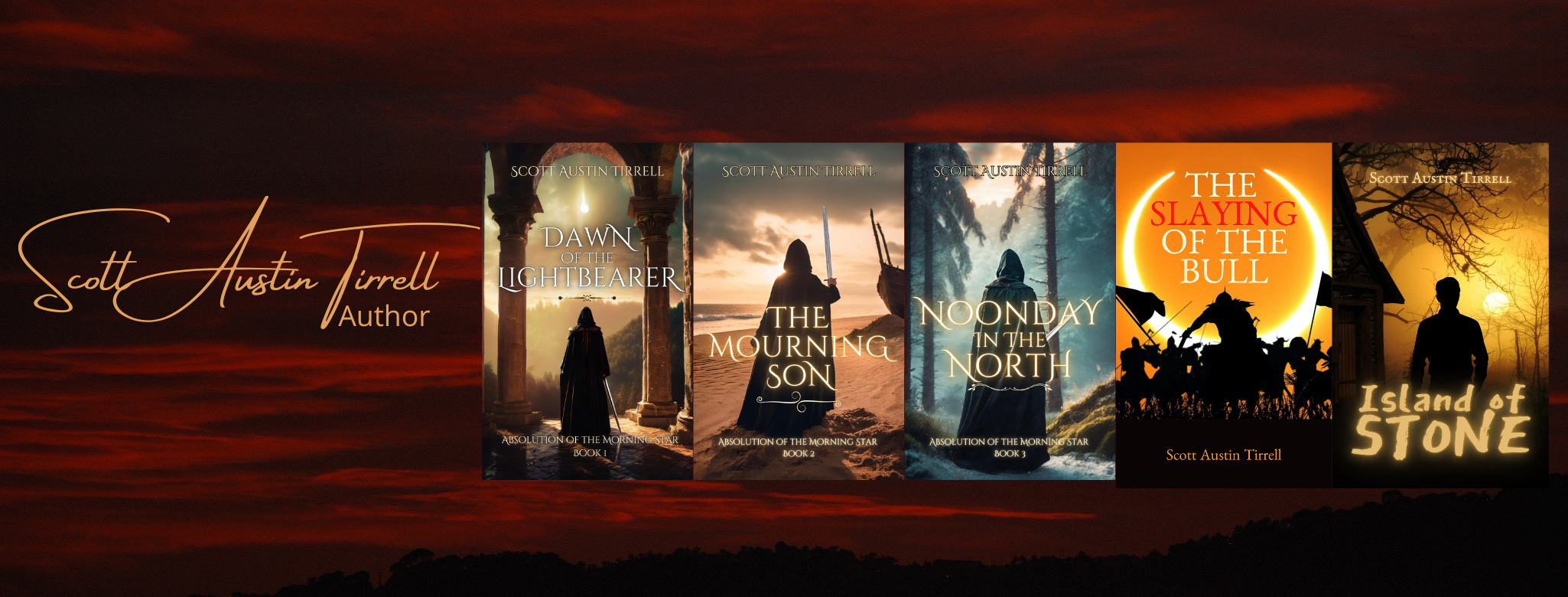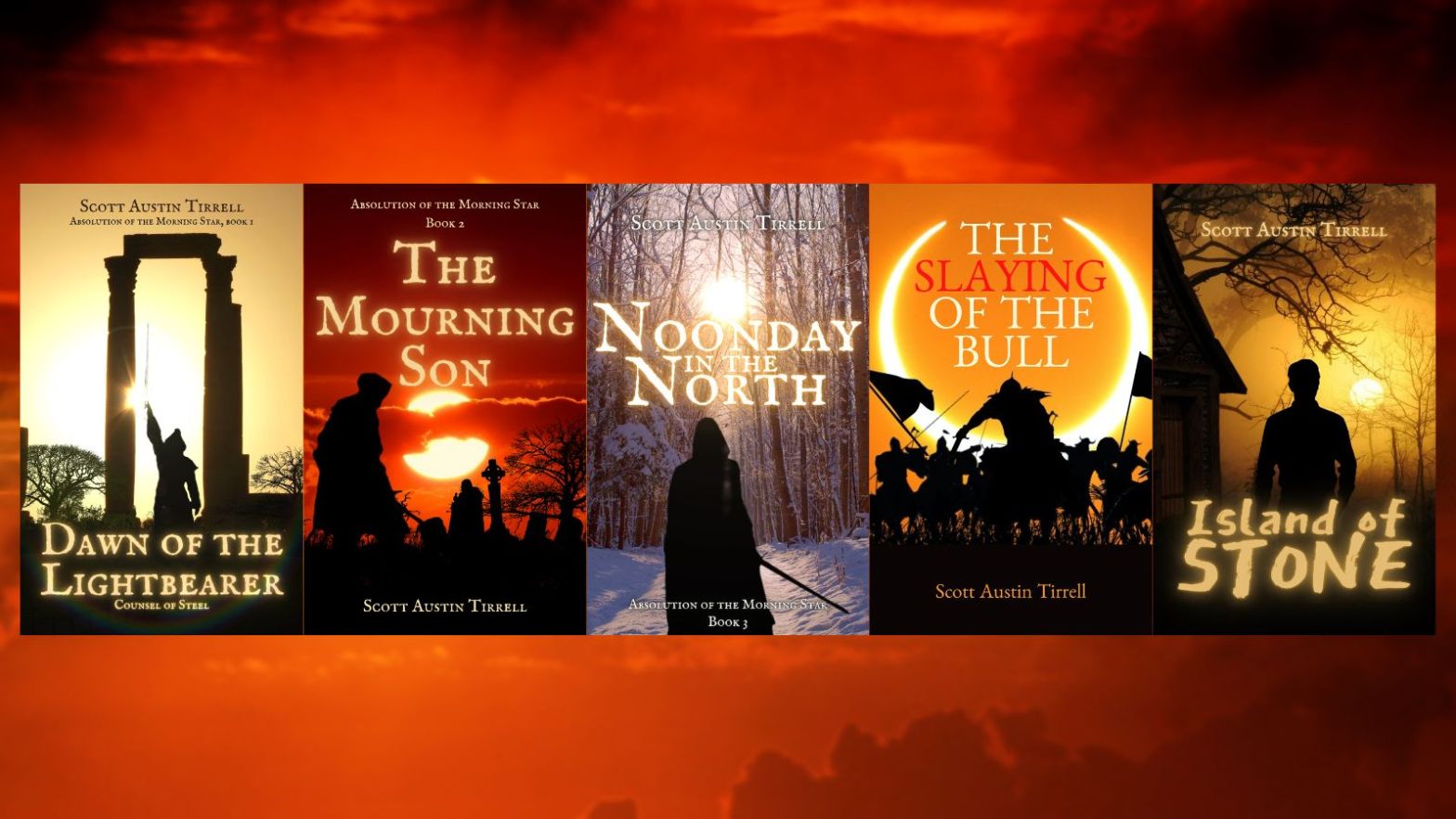Recently, I updated my book covers for the Island of Stone and The Slaying of the Bull and noticed something. In my last post, I elaborated a bit on my writing journey and explored how I chose fantasy as my genre, but there is another aspect of my writing that is a bit more fundamental: darkness.
So, why dark fantasy? That is an interesting question. To understand why, we should first understand what. On the surface, what dark fantasy is seems obvious, but is it? Categorizing your writing is tough. No one likes to be put in a box, but you do need to target your readership. I sometimes find myself on the fence when I think about my stories. Am I really writing dark fantasy, or is that just where I want to be?
So perhaps I should first try to define the dark fantasy genre for the uninitiated and possibly reassure myself in the process.
Like many things, fantasy is a spectrum, and most fantasy has darkness or evil associated with it. Some authors stay in the middle of that spectrum, and others drift to the lighter or darker sides. The sliding scale makes the definition tricky and contentious, and I’ve read a dozen variations. I conceptualize it this way: If Tolkien spent more time in Mordor than in the Shire and was more descriptive of the violence and bold with the evil, Lord of the Rings would be considered a dark fantasy, not a high/epic fantasy. Tolkien’s tales indeed contain darkness, but that is not where he chose to dwell. In sum, if you write a horror story- wait, no, that is also a contentious term. If you write a creepy tale, regardless of how it manifests itself (blood and guts, supernatural, paranormal, psychological, etc.), and then set it in an imaginary world, you basically get dark fantasy. It often has undertones of terror and utter gloom but still has an element of hope. If the story stays in hopelessness, you get grimdark.
I’ve never been a writer that dwells too long in the sunshine. Maybe it’s because I’m a redhead, and the sun is an eternal enemy, but writing creepy scenes at night with tortured characters facing impossible decisions is where I thrive. I am much more attracted to life’s gritty underbelly, and I don’t think that will ever change. The whys to that delve into my deeper psychology, which I would need someone with a Ph.D. to unpack entirely, but I can give a general summation.
It probably started in the tumultuous teens. A lot happens in those years, but one key thing is, for some of us, you begin to figure out that all the possibilities of childhood might not occur. That is step one, and we’ll come back to it. My love of music also appeared during this time. A feeling of hopelessness that I would never be a physicist researching nuclear fusion (a true aspiration from my youth) because I got shitty grades in math pulled me towards heavy metal, starting with Metallica, and moved further into death metal and grindcore, where dark themes form the foundation. Ok, I’m not alone in these feelings. That’s pretty cool. And look, these cats are making a pretty good living talking about that! Boom, I find myself in a death metal band surrounded by those thoughts, ideas, and, most importantly, frustrations. That is step two.
You don’t have metal music without dipping a toe in the occult. Yes, this is a stereotype. There is Christan metal that is just as hard-hitting (Demon Hunter is one of my favorite bands), and people who listen to metal music are not all Satanists, but some of that worldview is involved. For me, it was more an interest rather than a belief. I imagine it was also a rebellion against attending church when I was young—all that changed in time- the fires of hell cooled, as it were. Now, I am as fascinated with the Bible as any theology, be that Islam, Judaism, pagan mythologies, you name it. But it started as a rebellion and moved to a passion for other world views, all just as intriguing and just as “believed” as Protestantism. All these belief systems include evil, so my fascination also consists of those notions, which is ok. You can only truly avoid sin if you know it when you see it.
But still, why this gravitation? I again return to that moment of discovery that life is unfair and there are real barriers to our dreams. There have been periods of my life where I was bullied and ostracized or simply ran into bad luck. I’ve had hard knocks, and thus my reality must contain a semblance of uneasiness that times won’t always be good. I know it could be worse, so hope still plays a large part in my life and, so too, in my writing. Thus, I don’t write grimdark. I see the need for some light to creep. How else can you produce shadows?
It is this complexity and sharp contrasts that stimulate my artistic eye. Yes, I think it’s the juxtaposition that interests me the most. It’s evident in my book covers and all my advertisements too. As the picture above demonstrates, I enjoy a good silhouette in front of vibrant colors. As with writing genres, I know life is not a dichotomy but a spectrum. But, often, the slide from good to evil or vice versa is only a single choice away, so the gradiation in the middle does appear to get very tight. You can’t understand the stakes if you don’t spend time in the dark and show the reader how foreboding that plummet can be. This sweet spot even finds a home in the name of the Absolution of the Morning Star‘s protagonist, Erikson Gray (and his father, Koen the Gray, in the prequel, Koen).
Wow, I’m always surprised when I get to this point in a blog. I start with a simple idea, and soon I am knee-deep in dissecting my existence. I hope I didn’t bore you with my “me” time, but I think it is always a valuable exercise to delve into the whys of things, especially when it comes to our artistic expression. Who we are and what we do and do not want to be is so easily transferred into our writing. Our lived experiences and the nuances it brings are the sparks in our practice that can’t be easily replicated (if at all), and thus they should be found and given a gentle breath into life.
Cheers!


I always find your musings interesting, Scott.
LikeLiked by 1 person
Thanks for reading them!
LikeLiked by 1 person
I think fiction that somehow incorporates the author’s lived experience is richer than that created purely from imagination.
LikeLiked by 1 person
It is vital to get out there and experience and observe life to its fullest to bring authenticity to the writing. The internet is an invaluable tool to bring us places we can’t go, but nothing can compare to experiencing something with all the scenes and honing in on those details.
LikeLike
Those covers are looking good, Scott.
LikeLiked by 1 person
Thanks!
LikeLiked by 1 person